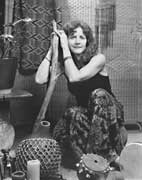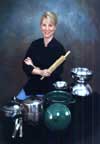 |
|||||||
|
Volume 13, Issue 1 ~ January 6-12, 2005
|
|||||||
|
|
How an artist, a percussionist and a chef veered off the straight and narrow ... and onto success. by Paula Anne Delve Phillips I want to run through the halls of my high school
'Cooking was in my blood ...' Forty-one-year-old Terry Antoniuk set out on a future for which neither her talent, her education nor her experience prepared her. With two degrees - including a Bachelor's in music education from University of North Texas in Denton, which is renown for its music department and jazz program - she has a lovely, trained voice as well as a solid grounding in music. In an earlier life in Dallas, the Texas native used both skills. "In the South, the arts flourish in public schools," Antoniuk says. "They would bring in all kinds of musicians to supplement what the schools' teachers were doing." After two years as a teacher, directing a public school choir, she joined that supplementary force, giving private lessons in voice and piano to public school students for three more years. Antoniuk (then Terry Sielert) left the security of teaching to follow her first husband to Waco, Texas, where he had landed a job teaching trumpet. When the marriage unraveled, she found herself both unemployed and husbandless. Texas grit came to her rescue. If she could not work in the field in which she was trained, she would create a new job for herself. Thus she made her love of cooking into her career. "When I was teaching, cooking became a release for me," Antoniuk says. "I cooked on weekends, holidays, summer vacation, immersing myself in cooking all kinds of things. That's when the food network was just coming on TV. I was really excited about that. I watched the cooking shows and began educating myself in cooking technique, cuisine and culture." In choosing a new path, Antoniuk also followed family footsteps. "My uncle was an artist and gourmet chef," she says. "My maternal grandparents had a restaurant. So I've been around cooks all my life. It's in my blood." An article about the emergence of personal chefs shaped her goal. Reading "about how you could make money and set your own hours, I liked the idea of having my own business," Antoniuk says. Soon, she was selling 10-day dinner packages to two-career families for about $310 a service. She gradually developed a service line that included personal chef services, cooking lessons and vacation packages. As a milestone of her success, Antoniuk was written up in Newsweek as a pioneer in the personal chef industry. Chef Antoniuk comes from a background of "down home" cooking, but her House Specials Personal Chef Service menu boasts an international array of entrees. Her pasta e fagioli with parmesan bread strips is mostaccioli pasta in a meat sauce, with red beans and fontina cheese and a broiled baguette with parmesan butter. Fish dishes include pecan-crusted flounder with roasted red bell pepper sauce and jambalaya with shrimp, chicken and sausage. Where's the beef? It's in the beef rouladen in Burgundy sauce and the beef tenderloin with scallion butter. The business Terry Antoniuk founded seven years ago was successfully transplanted to Annapolis when, in another act of faith, she moved north with her husband, Jeff Antoniuk, a saxaphone player and teacher. Terry Antoniuk can imagine expanding beyond this career. As she dreams, she and her husband are, she says, "playing board games like 'Cash Flow' and reading books on multiple income."  The Percussionist The PercussionistLanding safely where few women have ventured ... Elizabeth Melvin was raised an Annapolitan, in a city where roads bear her family name. She had studied abroad and spoke fluent French but had no practical skills. Soon after her college graduation, her grandmother gave her a precious gift. Selling it was easy. Then the work began. This is not the plot for a romance novel but a turning point in the life of a woman who has more than once leapt from a lofty perch to land safely where few women have ventured. Back in the late 1970s, Melvin, now 49, began sitting in as a guest percussionist with the Annapolis jazz-fusion band Wooden Hands, which flourished into the '80s and ignited the careers of many of the region's prominent players. She liked being on stage, and her array of shakers, cowbells and rattles enriched the band's sound. But, she realized, if she wanted to play music she'd need her own instruments. Opportunity knocked in the form of her grandmother's gift of a diamond bracelet in a platinum setting. "I realized the gift could be an entreé into this new world of music and performing," she says. "After a lot of thought, I sold the bracelet." With the proceeds, she bought a three-octave Musser kelon marimba, a brand of xylophone with African and Latin ancestors. "I was completely enthralled with this new instrument," she says. " It combined my love of piano and my budding interest - fascination really - with percussion." Melvin had been trained on piano as a child and expected to master the marimba keyboard without much trouble once she got used to striking the keys with mallets instead of her fingers. Soon, she was accepted as a full-fledged member of Wooden Hands, playing at clubs, colleges and festivals in Baltimore, Washington and Annapolis. There were other difficult choices on this road less-traveled. In her 30s, Melvin gave up her job with a cultural foundation in Washington, D.C., to go back to school, enrolling in a graduate program in ethnomusicology at University of Maryland Baltimore County. A professor there inspired her to make firsthand discoveries of Afro-Cuban and African music. Seeking teachers of Afro-Cuban rhythms, she first ventured into the Adams Morgan neighborhood of D.C. Some of the teachers were nearly destitute refugees from the infamous Mariel Boat Lift that evicted homosexuals and thieves as well as some fine musicians from the shores of the island to American soil. Working with these artists, Melvin discovered it might take her a lifetime to play a rhythm such as yambu or Colombia as fluently as a 12-year-boy might in the streets of Matanzas. Over the years, Melvin supplemented her musician's earnings by working as an arts administrator. She held positions with the Smithsonian, Maryland Hall for the Creative Arts and First Night Annapolis. The persistence she'd learned mastering Cuban rhythms paid off in landing those jobs. At First Night, Melvin called, waited, then called again. "My intuition was that I would be a good fit for the job," she recounts. Her instincts were accurate. While other employees came and went from the small non-profit, Melvin remained. Her knowledge of ethnomusicology contributed to diverse programming. Her performing experience helped her write detailed contracts for Maryland's largest single-day arts celebration. After six years, the development of outreach programs at First Night led to her current work, teaching world rhythms to middle school students. Melvin has continued to study and play a variety of musical styles. She is probably best known for her 11-year association with the band Mama Jama. With that group, she has played for audiences of 10,000 people or more, joyously dancing to songs she had labored over in the depths of late-night song writing, a "Slave to the Music," as one of her most popular pieces is called. Today, she and partner David Boothman, from Trinidad, collaborate in three Caribbean groups: Goombay does school shows whereas both Jambulay and Caribbean Arts Jazz Ensemble play clubs and concerts. Because of her tremendous influence in the Annapolis area music scene, Melvin is included in the Facing the Music photography exhibit at 49 West this month. On February 25, she'll reunite with Steve Bloom - whom she met in her days studying with Cuban musicians in Adams Morgan - as featured guest artists in the Footworks Percussive Dance Ensemble's Annual Hometown Show at Maryland Hall for the Creative Arts. "When you follow an unconventional career path, there's adventure all along the way," Melvin says. "I'm always looking for the next stepping stone, the next opportunity."
|
||||||
|
© COPYRIGHT 2004 by New Bay Enterprises, Inc. All rights reserved. |


 The Apprentice
The Apprentice